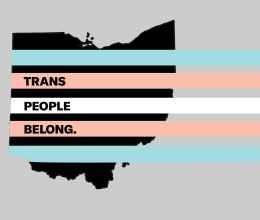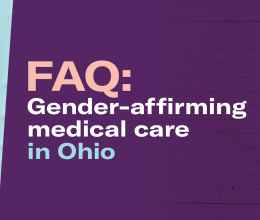Late last year, the Ohio State Board of Education passed a resolution expressing its opposition to the federal government’s proposed Title IX protections for LGBTQ+ students. I imagine that, upon hearing this news, many folks had a few questions: what is the Board, and what does it do? Are its members elected or appointed? Why would they want to pass this sort of resolution attacking queer students instead of pursuing affirming policies? Lastly, what does the resolution actually accomplish, and is it legally enforceable?
Before diving in, it is important to give context: Title IX of the Education Amendments of 1972 “prohibits sex discrimination in any education program or activity receiving federal financial assistance,” per the U.S. Department of Justice (USDOJ).
So, what is the Board? It is a statewide education oversight body comprised of 19 members, 11 of whom are elected and eight of whom are appointed by the Governor. The 11 elected members each represent a district comprised of three Ohio Senate districts.
As for what the Board does: it adopts minimum curriculum standards for local school districts, chooses the State Superintendent of Public Instruction, oversees the disciplinary process for teachers, and issues recommendations to the Ohio General Assembly on pending legislation, among other responsibilities. Occasionally, the Board will pass resolutions that express its members’ view on a certain topic, as is the case with this particular resolution.
So, what did the Board do when it passed its December 2022 “Resolution to Oppose the Proposed Changes to Title IX and to Affirm Parental Rights and Local Control of Ohio K-12 Education?”
To start, it is vital to note that the Board is not a legislative body. Thus, it does not have the power to make laws, nor can it enforce its resolutions. In other words, the Board’s resolutions are merely recommendations—in this case, to local school districts and the state legislature. As of January 19, 2023, nothing has legally changed as a result of the December Board vote.
That said, the Board can still do great harm to queer students, who may receive less support at school if local districts and the legislature decide to act upon its recommendations. What the Board says carries weight even if it does not carry legal force.
Firstly, the resolution expresses the Board’s opposition to the U.S. Department of Education’s (USDOE’s) proposed changes to Title IX regulations aimed at protecting queer students, particularly transgender and gender-nonconforming students, from discrimination based on sexual orientation or gender identity.
Further, the Board voices its support for Ohio Attorney General Dave Yost’s lawsuit against the U.S. Department of Agriculture (USDA), which seeks to invalidate USDA’s rule tying USDOE’s proposed guidance to funding for reduced meal programs in schools. So, if Attorney General Yost is successful in his legal battle, school districts who do not follow the guidance would risk losing funding to assist food-insecure students.
Next, the resolution vaguely calls on the General Assembly to protect a host of things: the “original intent” of Title IX against supposed federal overreach, parents’ rights and the “innocence of children,” women and girls’ opportunities in school and sports, and local control in education. As of now, the General Assembly has not passed any such laws.
However, in December, it very nearly passed a bill banning trans girls and women from playing on teams that match their gender identity. An Ohio House committee also held several hearings on a bill banning gender-affirming care for minors. These bills could be revived at any time in the new legislative session.
Lastly, the Superintendent is required to send a letter to every school district informing them of the Board’s opposition to the USDOE and USDA’s actions, which the Board views as “unenforceable.” The resolution does note that the Board seeks to “inform schools and districts” with this letter and their position, not to compel them to any specific action.
The problem here is that the Board’s goal is not just to “inform,” the Board’s goal is to push a harmful, medically inaccurate narrative about queer students, especially transgender and gender-nonconforming students, in the name of scoring political points. This self-righteous letter does nothing substantively to the way local schools operate, but the intention and potential damaging fallout is of huge consequence. Queer students and their identities are not an “issue” for elected officials to debate.
If the goal were to inform, the Board could empower medical professionals and advocates to educate districts on how to best support these kids. Instead, the Board’s resolution and the Superintendent’s letter may embolden some districts to marginalize queer students.
The Board had an opportunity to make our schools safe and welcoming places for every student. However, as former board member Tim Miller noted during one of several hearings last year, the resolution makes no effort to do so. The language does not contain proactive provisions, outside of an empty and hypocritical acknowledgment of the pain suffered by those who experience gender dysphoria.
Again, this resolution does not have any impact on the law. Its passage does not mean that school district will suddenly be able to discriminate against queer students. However, we must be vigilant and stand against any anti-LGBTQ+ actions local districts may take in the future.
As for the legislature, in all likelihood, the members who sponsored the anti-LGBTQ+ bills from the previous General Assembly will reintroduce them soon. Advocates will again need to collectively organize to ensure they do not pass.
On top of that, individuals are taking matters into their own hands by suing local districts who do have affirming policies in place for queer students. This is the case with a lawsuit against Bethel Local School District’s policy of allowing trans students to use the bathrooms that match their gender identity. The ACLU of Ohio recently filed a motion to join the case on behalf of a 14-year-old student who would be impacted negatively should the plaintiffs succeed.
The ACLU of Ohio will always fight against attacks on LGBTQ+ Ohioans’ right to be their authentic selves, free from oppression or discrimination.






